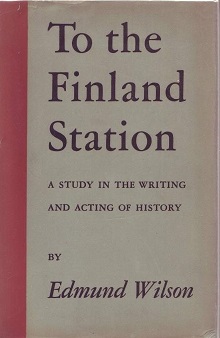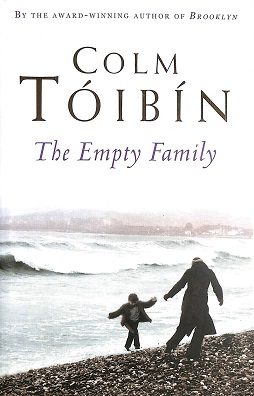
Nicholson Baker is an American novelist and essayist. His fiction generally de-emphasizes narrative in favor of careful description and characterization. His early novels such as The Mezzanine and Room Temperature were distinguished by their minute inspection of his characters' and narrators' stream of consciousness. Out of a total of ten novels, three are erotica: Vox, The Fermata and House of Holes.

Colm Tóibín is an Irish novelist, short story writer, essayist, journalist, critic, playwright and poet.

To the Finland Station: A Study in the Writing and Acting of History is a book by American literary critic Edmund Wilson, first published in 1940. The work presents the history of revolutionary thought and the birth of socialism, from the French Revolution through the collaboration of Karl Marx and Friedrich Engels to the arrival of Vladimir Lenin at the Finland Station in Saint Petersburg in 1917.

The Master is a novel by Irish writer Colm Tóibín. His fifth novel, it received the International Dublin Literary Award, the Stonewall Book Award, the Lambda Literary Award, the Los Angeles Times Novel of the Year and, in France, Le prix du meilleur livre étranger in 2005. It was also shortlisted for the 2004 Booker Prize.

The South is a 1990 novel by Irish writer Colm Tóibín.

Episodes of the Cuban Revolutionary War, also titled Reminiscences of the Cuban Revolutionary War, is an autobiographical book by Marxist revolutionary Che Guevara about his experiences during the Cuban Revolution (1956–1958) to overthrow the dictatorship of Fulgencio Batista.

Postwar: A History of Europe Since 1945 is a 2005 non-fiction book written by British historian Tony Judt examining the six decades of European history from the end of World War II in Europe in 1945 to 2005. Postwar is widely considered one of the foremost accounts of contemporary European history, particularly with regards to the history of Eastern Europe. It has been translated into French and German.

The Goebbels Diaries are a collection of writings by Joseph Goebbels, a leading member of the Nazi Party and the Reich Minister of Public Enlightenment and Propaganda in Adolf Hitler's government from 1933 to 1945. The diaries, which have only recently been published in full in German and are available only in part in English, are a major source for the inner history of the Nazi Party and of its twelve years in power in Germany. The British historian Ian Kershaw wrote in the preface to his biography of Hitler: "For all the caution which must naturally be attached to Goebbels's regularly reported remarks by Hitler ... the immediacy as well as the frequency of the comments makes them a vitally important source of insight into Hitler's thinking and action."

The Irish Famine is a book written by Diarmaid Ferriter and Colm Tóibín. The book is in two volumes, the first of which was written and originally published by Tóibín in 1999. The second volume, written by Ferriter, is entitled The Capricious Growth of a Single Root and was added in 2001.

The Metaphysical Club: A Story of Ideas in America is a 2001 book by Louis Menand, an American writer and legal scholar, which won the 2002 Pulitzer Prize for History. The book recounts the lives and intellectual work of the handful of thinkers primarily responsible for the philosophical concept of pragmatism, a principal feature of American philosophical achievement: William James, Oliver Wendell Holmes Jr., Charles Sanders Peirce, and John Dewey. Pragmatism had a significant influence on modern thought, by, for example, spurring movements in legal thought such as legal realism.

Love, Poverty, and War: Journeys and Essays is a collection of essays and reportage by the author, journalist, and literary critic Christopher Hitchens. The title of the book is explained in the introduction, which informs the reader that "an antique saying has it that a man's life is incomplete unless or until he has tasted love, poverty, and war."

The Book of Other People is a collection of short stories, published in 2008 by Penguin Books. Selected and edited by Zadie Smith, it contains 23 short stories by 23 different authors, among them Nick Hornby, David Mitchell, Colm Tóibín, Jonathan Safran Foer, Dave Eggers, as well as Smith herself. The collection, as evidenced by the title, focuses on character; the authors were simply asked to "make somebody up". It being a "charity anthology," the contributors to The Book of Other People were not compensated for their writing, and the book's proceeds were given to 826NYC, a non-profit organization dedicated to supporting students with their creative writing skills.

Harry Clifton is an Irish poet.

Human Chain is the twelfth and final poetry collection by Seamus Heaney. It was first published in 2010 by the Faber and Faber.

The Empty Family is a collection of short stories by Irish writer Colm Tóibín. It was published in the UK in October 2010 and was released in the US in January 2011.

Mortality is a 2012, posthumously published book by Anglo-American writer Christopher Hitchens. It comprises seven essays which first appeared in Vanity Fair concerning his struggle with esophageal cancer, with which he was diagnosed during his 2010 book tour and which killed him in December 2011. An eighth chapter consisting of unfinished "fragmentary jottings", a foreword by Graydon Carter and an afterword by Carol Blue, are also included in the publication.

Ryan Kyle Coogler is an American filmmaker. He is a recipient of four NAACP Image Awards and four Black Reel Awards, and has been nominated for two Academy Awards, a Golden Globe Award, and a Grammy Award.
The Testament of Mary is a play written by Colm Tóibín, based on his 2012 novella of the same name and 2011 play Testament. The play is a solo performance depicting "the mother of Jesus [who] tells her story of her son’s Crucifixion" and questions his death and divinity. After a 2011 Irish production, the play ran briefly on Broadway in 2013, closing after only two weeks of a scheduled 12-week run, but it was nominated for three Tony Awards, including Best Play.

The Way the World Works is a 2012 book by Nicholson Baker that collects thirty-four previously published essays together. These essays were originally published in a variety of publications, including The New York Times, The New York Review of Books, and The New Yorker.


















